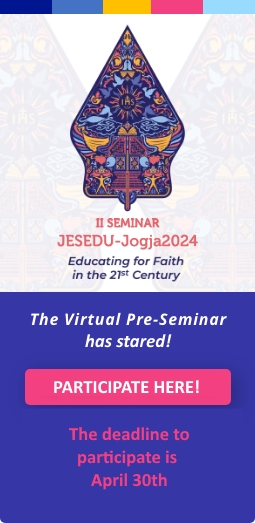Continuing with the series of articles written by Fr. Sunny Jacob SJ, we present “Spiritual Conversation and Communal Discernment – Part 3”. These articles are a guide to help us understand what, why, and how of Spiritual Conversation.
Spiritual Conversation and Communal Discernment – Part 3
Having Spiritual Conversations
Three Steps to Follow
Spiritual Conversation has three steps to follow. The best spiritual conversations happen in a place where the other person feels comfortable. Be attentive to location, who is around you, lighting, etc
Ignatian Prayer
We Pray over the theme proposed. As we pray, we pay attention to the interior movements: of joy, peace, confusion, agitation, confirmation. We become aware of our own level of interior freedom or the lack of it in prayer. In that awareness, we consider prayerfully the theme proposed, with reasons for or against. We make ourselves ‘indifferent’ and consider the points. We end with a review of the prayer.
First Round: Personal Sharing
It is a process of Active listening: The goal of active listening is to understand others as they are without any hierarchy, or position among participants. It is called “active” because it involves paying attention to more than one level of expression of the other. It involves listening not only to what the other person is saying, but also to what they mean to say, and to what they might be experiencing interiorly. This listening is a profound welcome of the other person in his or her radical uniqueness. This intentional welcome is rooted in the expectation that the Spirit is speaking with us through the other person. In fact, Active listening means welcoming non-judgmentally whatever the person says, no matter what you think about what is being said, or what you think about the person. We presuppose the fact that each person is an expert in his or her own experience.
One listens from the point of view of the Presupposition of the Spiritual Exercises, that is, to be “more ready to put a good interpretation on another’s statement than to condemn it as false”*. Through active listening you offer to others the profound gift of taking them seriously. When you are not speaking, active listening is your main role. At this juncture you are not to comment in any way on what another has said, not even to say something positive like “I agree with so-and-so”. Such comment or “cross talk” at this stage may inadvertently cause someone to change what they intended to say, or feel that this is not a safe place to speak freely. You are respectfully listening to a person’s experience that is unique and precious. Active listening means allowing oneself to be affected by the other. Remember, Active listening is demanding, for it requires humility, openness, patience and involvement. It means listening to the other now as he or she is speaking, and not concentrating on what one will say next.
The goal of intentional speaking is to express one’s experience, feelings and thoughts. Intentional speaking is based in a habit of listening actively to oneself. This inner self-awareness then guides how one engages in the conversation, sharing the truth as one sees or experiences it and remaining free of selfish motivations in what one says. This self-awareness gives one’s speaking its “intentional” character.
Second Round: Reflective Sharing
The leader invites the members to share what they heard and how they were affected by what they heard. The leader can animate with the following questions in mind to get the best of the conversation. What did you hear? Were you struck by a common theme? Is something you expected to hear absent? Where did you experience harmony/dissonance with the others as they shared? What emotions are you feeling now? What insights occur to you? Is the Spirit telling ‘us’ something – as a group.
The second round enables the group to notice what is happening spiritually to them through the conversation. These reflective responses begin to manifest the communal movements of spirits in the group. These responses are essential data if the spiritual conversation is to take on a communal discernment character.
Points for Group Members to remember
1. Choose someone to be the timekeeper (See below)
2. Listen attentively. Try to detect what is being said over and beyond the words.
3. Welcome what is said with gratitude. Do not condemn. Each person is the expert on his or her own experience.
4. When speaking, take the feather. While you are holding it, the others are silent.
5. Share what you can, and what you want to share.
6. Do not agree is also OK (not to be expressed until the 2nd round of sharing!).
7. Share briefly and clearly.
8.Guidelines for Spiritual Conversation
9.The small group is not the place to resolve individual problems.
9. Times of silence are appropriate and necessary.
10. Respect what is confidential.
11. Use “I” when speaking; do not use “we” or “you”.
Third Round of sharing: Discussion
In this round, the group seeks to name the spiritual movements they have recognized on the basis of the second-round sharing. Here the mode of exchange can be more discussion on the matter proposed for the discernment, with intellectual understanding on the subject.
Reflections on the energy and power cycle in the group
All humans are driven by an energy that compels them to contribute to life, to care for it, to enhance it, the life of others and their own. This is the most vivid manifestation of divine energy and divine power that is within us all.
The Holy Spirit is the divine energy of love that the group receives when it stays connected with the divine source, or when it reconnects with it. It then has new life, new momentum and vitality. The members of the group are interconnected with one another, present to one another, bringing forth from each one, and offering to everyone, the best of their selves. As we are using the word here, power means; the capacity to react, to evaluate, to make recommendations, to decide and to influence. As it was created and given by God, power is a good thing. As such, we are to ask God for it: it gives life.
Group Power
Who has the power in the group? Each person in the group has the power to decide, to act, to evaluate and make recommendations. Each person has the capacity to influence the others and to be influenced by them. Even a newborn exercises power over its parents! Power is not limited to the capacity to decide. All humans have the power to become more authentically themselves and grow in humanity. They have the power to decide, in conscience, according to the inclination of reason, ethics or the Holy Spirit. And they have the power to oppose, in conscience, decisions that are contrary to reason, ethics or inclination of the Holy Spirit.
But everyone also has the power to play the game of the bad spirit, to allow themselves to be seduced and finish by being less human. Human freedom can use power badly. The manner in which we use it requires vigilance and evaluation. In terms of ideas, experience and all sorts of capacity and resources, a group possesses, for better or for worse, a much greater power than a simple individual.
The two opposing temptations for every member of a group are abuse of power and resignation. Abuse of power consists in taking the power that belongs to someone else. Resignation consists of giving up the power that belongs to us. When we were infants and we were faced with abuse of power, the only way that we could assure our survival was through resignation. Now that we are adults, our goal is no longer survival but to live fully: we must resist abuse of power and dare courageously to exercise our own power.
God with His Divine Power of Love is a work in our personal dreams and in our deepest desires, as well as in the deepest and truest desires of the group. This is true even if certain illusions and impulses are also hidden in our dreams. The purpose of the Power Cycle is to help us become conscious of what we are not aware of, or not enough aware of.
The energy and power of a group is linked directly to the members freely choosing to commit themselves in efforts to achieve a goal which they themselves have freely chosen and adopted. When we take the initiative to make recommendations and suggestions to someone in authority, we also need to say to what extent we are prepared to commit personally to the actions that will be necessary to implement our recommendations.
In short, GC 35 has emphasised candidly that a Jesuit community is not just for mission: it is itself mission. Jesuit identity and Jesuit mission are linked by community; indeed, identity, community, and mission are a kind of triptych shedding light on how our companionship is best understood. (GC 35, D 2, 19); Jesuit community is not just for mission: it is itself mission. (GC 35, D 3, 41). GC 35 further adds that “in order to live our mission we need fraternal and joyful communities, where we can nourish and express with great intensity our only passion that can unite our difference, and give life to our creativity” (GC 35, D 2, 27). The GC 36 makes it an effective tool for us to have individual and communal discernment. The joyful and vibrant mission-community can come into existence only if the companions have already possess the union of minds and hearts. I think Spiritual Conversation is a step forward in this direction. Let us follow it.
*Spiritual Exercises (SE) n.22.

